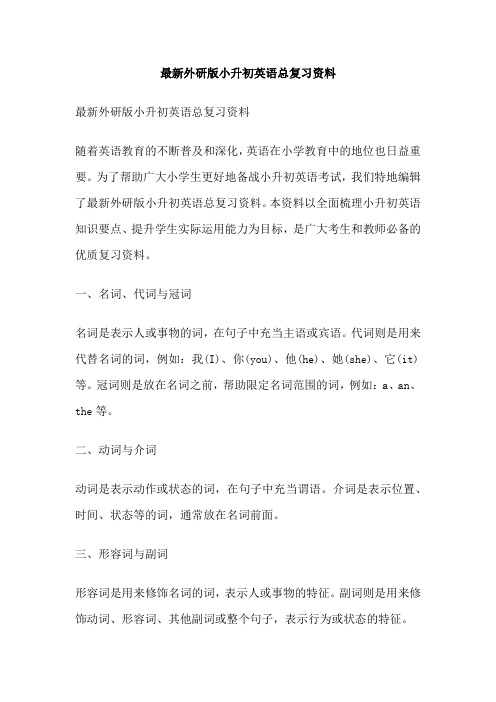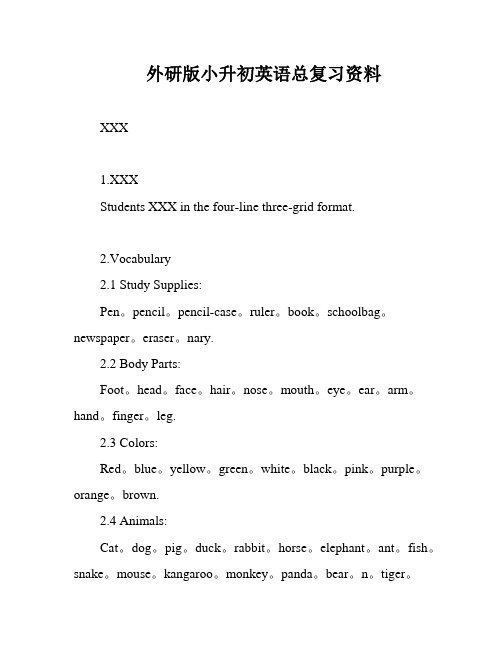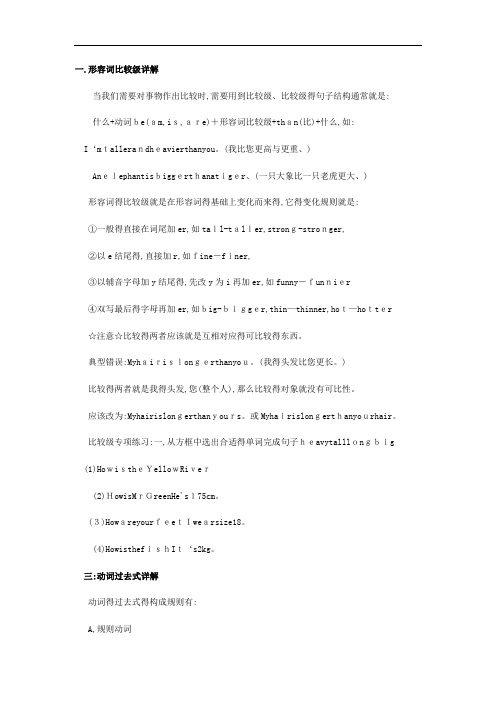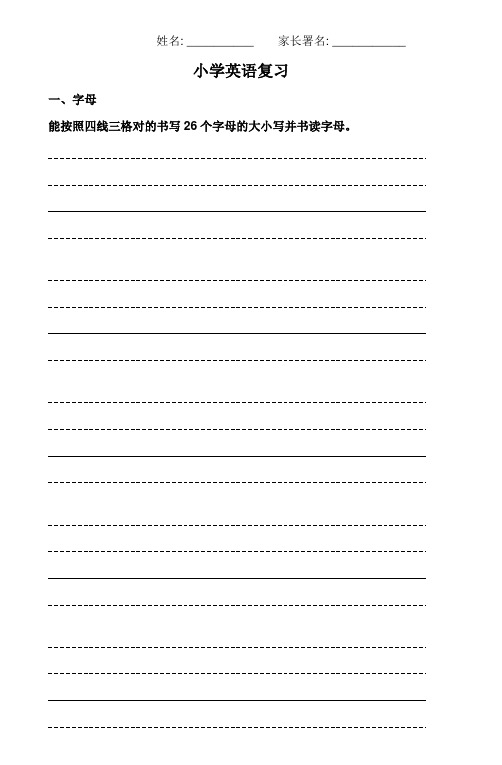最新外研版小升初英语知识汇总
(完整word版)外研版小学英语语法总复习知识点归纳

(完整word版)外研版小学英语语法总复习知识点归纳外研版小学英语语法总复知识点归纳一、时态1.一般现在时(1)表示经常发生的动作或事情,通常用“usually通常,often常常,every…每…。
sometimes有时,always总是,”等词。
(2)基本结构:主语I / You / We / They /He / She / It肯定句:主语+动词原形或动词第三人称单数形式否定句:主语+don’t + 动词原形或者doesn’t + 动原一般疑问句(Yes/No) Do…。
Yes。
I do.No,I don’t.Does…(动词原形)…?Yes,he/she does。
No,he/she doesn’t.特殊疑问句What do …。
How does she…(动词原形)…?(3)动词第三人称单数方式(同名词单数酿成复数办法不异)1.普通情形+s如:walk-walks2.辅音字母+y结尾去y +ies fly-flies3.结尾是s。
x,sh。
ch +es watch-watches4.结尾是0 +es do-does。
go-goes5.特殊have-has2.现在进行时(1)表示正在发生的动作,通常用“now现在。
look看,XXX听”.(2)根本方式: be +动词-ingeg: I am(not) XXX.You/We/They are(not) reading。
He/She/It is(not) eating.What are you doing。
Is he reading?(3)动词的目前分词方式(动词+ing)普通情形+ing walk—walking末端是不发音的e-e+ingcome—coming重读闭音节双写末了一个字母+ingswim-swimming。
run-running3.一般过去时(1)表示过去已经发生的事情,通常用“last …上一个…。
just now刚才,many years ago许多年前,XXX昨天”等词。
最新外研版小升初英语总复习资料

最新外研版小升初英语总复习资料最新外研版小升初英语总复习资料随着英语教育的不断普及和深化,英语在小学教育中的地位也日益重要。
为了帮助广大小学生更好地备战小升初英语考试,我们特地编辑了最新外研版小升初英语总复习资料。
本资料以全面梳理小升初英语知识要点、提升学生实际运用能力为目标,是广大考生和教师必备的优质复习资料。
一、名词、代词与冠词名词是表示人或事物的词,在句子中充当主语或宾语。
代词则是用来代替名词的词,例如:我(I)、你(you)、他(he)、她(she)、它(it)等。
冠词则是放在名词之前,帮助限定名词范围的词,例如:a、an、the等。
二、动词与介词动词是表示动作或状态的词,在句子中充当谓语。
介词是表示位置、时间、状态等的词,通常放在名词前面。
三、形容词与副词形容词是用来修饰名词的词,表示人或事物的特征。
副词则是用来修饰动词、形容词、其他副词或整个句子,表示行为或状态的特征。
四、语法与句型语法是英语语言的规则,句型则是按照特定结构排列的句子模式。
在复习中,应重点掌握常用句型、时态、语态等语法知识,以便在实际运用中做到游刃有余。
五、阅读理解与完形填空阅读理解与完形填空是小升初英语考试中的重头戏。
在复习过程中,要注重培养快速阅读理解能力,掌握常见的阅读策略和技巧,如略读、扫读、预测、推断等。
同时,还要加强完形填空的练习,培养结合上下文判断填空的能力。
六、听力和口语听力和口语能力的提高需要长期的积累和训练。
在复习阶段,建议多听英语原版材料,如故事、新闻、电影等,以提升听力理解能力。
同时,要积极参与口语练习,与同伴或老师进行对话交流,培养流利的口语表达能力。
七、写作写作是小升初英语考试中的重要部分。
在复习过程中,要掌握基本的写作技巧,如段落结构、句式变化等。
此外,还要积累常用的写作素材,如短语、句型、名人名言等,以提升文章的表现力和文采。
总之,最新外研版小升初英语总复习资料为广大小学生提供了一份全面、系统的英语知识梳理。
外研版小升初英语总复习资料

外研版小升初英语总复习资料XXX1.XXXStudents XXX in the four-line three-grid format.2.Vocabulary2.1 Study Supplies:Pen。
pencil。
pencil-case。
ruler。
book。
schoolbag。
newspaper。
eraser。
nary.2.2 Body Parts:Foot。
head。
face。
hair。
nose。
mouth。
eye。
ear。
arm。
hand。
finger。
leg.2.3 Colors:Red。
blue。
yellow。
green。
white。
black。
pink。
purple。
orange。
brown.2.4 Animals:Cat。
dog。
pig。
duck。
rabbit。
horse。
elephant。
ant。
fish。
snake。
mouse。
kangaroo。
monkey。
panda。
bear。
n。
tiger。
fox。
deer。
hen。
sheep。
goat。
cow。
bird。
camel。
frog。
cock。
dragon。
owl。
parrot.2.5 People:Friend。
boy。
girl。
mother。
father。
sister。
brother。
uncle。
man。
woman。
Mr。
Miss。
lady。
mom。
dad。
parents。
grandparents。
grandma/grandmother。
grandpa/grandfather。
aunt。
cousin。
son。
daughter。
baby。
classmate。
people。
robot.2.6 Jobs:XXX。
student。
doctor。
nurse。
driver。
farmer。
singer。
writer。
actor。
actress。
artist。
TV reporter。
policeman。
police.3.Food and Drink:No n provided.Note: The original text had many formatting errors and plete sentences。
外研版小升初英语知识汇总

一.形容词比较级详解当我们需要对事物作出比较时,需要用到比较级、比较级得句子结构通常就是: 什么+动词be(am,is,are)+形容词比较级+than(比)+什么,如:I‘mtallerandheavierthanyou。
(我比您更高与更重、)Anelephantisbiggerthanatiger、(一只大象比一只老虎更大、)形容词得比较级就是在形容词得基础上变化而来得,它得变化规则就是:①一般得直接在词尾加er,如tall-taller,strong-stronger,②以e结尾得,直接加r,如fine-finer,③以辅音字母加y结尾得,先改y为i再加er,如funny-funnier④双写最后得字母再加er,如big-bigger,thin—thinner,hot—hotter☆注意☆比较得两者应该就是互相对应得可比较得东西。
典型错误:Myhairislongerthanyou。
(我得头发比您更长。
)比较得两者就是我得头发,您(整个人),那么比较得对象就没有可比性。
应该改为:Myhairislongerthanyours。
或Myhairislongerthanyourhair。
比较级专项练习:一,从方框中选出合适得单词完成句子heavytalllongbig(1)HowistheYellowRiver(2)HowisMrGreenHe's175cm。
(3)HowareyourfeetIwearsize18。
(4)HowisthefishIt‘s2kg。
三:动词过去式详解动词得过去式得构成规则有:A,规则动词①一般直接在动词得后面加ed:如worked,learned,cleaned,visited②以e结尾得动词直接加d:如lived,danced,used③以辅音字母加y结尾得动词要改y为i再加ed(此类动词较少)如study-studiedc arry—carriedworry-worried(注意play,stay不就是辅音字母加y,所以不属于此类)④双写最后一个字母(此类动词较少)如stoppedB,不规则动词(此类词并无规则,须熟记)小学阶段要记住以下动词得原形与过去式:sing-sang,eat-ate,see-saw,have-had,do—did,go—went,take-took,buy-bought,get-got,read—read,fly-flew,am/is—was,are-were,say-said,leave—left,swim-swam,tell—told,draw-drew,come-came,lose-lost,find-found,drink—drank,hurt-hurt,feel—felt四:动词现在分词详解动词得ing形式得构成规则:①一般得直接在后面加上ing,如doing,going,working,singing,eating②以e结尾得动词,要先去e再加ing,如having,writing③双写最后一个字母得(此类动词极少)有:running,swimming,sitting,gettin g五:人称代词与物主代词一、人称代词二、物主代词六:句型专项归类1。
外研版小升初必掌握词汇

外研版小升初必掌握词汇小升初是指小学毕业的学生升入初中的过程。
为了帮助学生顺利过渡到初中阶段,他们需要掌握一定的词汇量。
以下是外研版小升初必掌握的词汇列表,供学生参考和研究。
一年级1. 英语词汇:- 数字:one, two, three, four, five- 颜色:red, blue, yellow, green- 动物:cat, dog, bird, fish- 水果:apple, banana, orange, grape- 家庭成员:father, mother, brother, sister2. 数学词汇:- 数字:一、二、三、四、五- 形状:圆、方、三角形- 算术符号:加号、减号、乘号、除号二年级1. 英语词汇:- 季节:spring, summer, autumn, winter- 学科:Chinese, Math, English, Science- 学校设施:library, classroom, playground, laboratory - 体育活动:running, jumping, swimming, cycling- 时间词:morning, afternoon, evening, night2. 数学词汇:- 数字:六、七、八、九、十- 分数:半、四分之一、三分之二- 运算:加、减、乘、除三年级1. 英语词汇:- 交通工具:car, bus, airplane, train- 食物:rice, noodles, bread, milk- 国家:China, America, Japan, Canada- 运动:football, basketball, tennis, swimming- 人物职业:doctor, teacher, singer, police2. 数学词汇:- 数字:十一、十二、十三、四十、一百- 圆:直径、半径、周长、面积- 一次方程:未知数、等号、解方程四年级1. 英语词汇:- 时态:present, past, future- 学科:history, geography, music, art- 环境:nature, pollution, recycling, energy- 职业:engineer, lawyer, actor, scientist- 运动:gymnastics, volleyball, skating, martial arts2. 数学词汇:- 数字:十四、十五、十六、五十、一千- 几何:平行、垂直、对角线、锐角、直角、钝角- 时钟:钟面、指针、时针、分针、秒针五年级1. 英语词汇:- 动词时态:simple present, present continuous, simple past- 文化:tradition, festival, custom, belief- 科学:biology, chemistry, physics, astronomy- 艺术:painting, sculpture, photography, architecture2. 数学词汇:- 数字:十七、十八、十九、一百五十、一万- 分数:分子、分母、相等、相似- 比例:比例尺、纵横比、正比例、反比例以上是外研版小升初必掌握的词汇列表,希望同学们能认真学习并掌握这些词汇,为顺利过渡到初中阶段打下良好的基础。
2023年外研版三起六年级小升初英语复习资料

有风的
cool
凉爽的
snow
下雪
sunny
晴朗的
hot
炎热的
rain
下雨
cloudy
多云的
weather report
天气预报
14.【Number 数字】
one 一
two 二
six 六
seven 七
eleven 十一
three 三 eight 八 twelve 十二
four 四 nine 九
five 五 ten 十 thirteen 十三
drop
need argue control
hear sit down copy
show
shine spend laugh make a mistake
stand up
go swimming
play basketball
帮助 希望 找到 使用 建议
到达
learn study bring stay borrow
常 从不
16.月份(Mouths):
fifteen 十五 eighteen 十八
thirty 三十 sixty 六十 ninety 九十
million 百万
weekend
周末
Tuesday Friday hour morning night
usually
星期二 星期五 小时 早上 夜间
通常
sixteen 十六 nineteen 十九
factory 工厂 13.【气象 (weather)】 : 寒冷的
cold
home 家 park 公园 school 学校 zoo 动物园 farm 农场 Wall 长城 room 房间 study 书房 village 乡村 bank 银行 city 城市 hospital 医院
外研版小升初必背词汇
外研版小升初必背词汇小升初必背词汇以下是小升初必须掌握的词汇:1.研究用品:钢笔(pen)、铅笔(pencil)、铅笔盒(pencil-case)、尺子(ruler)、书(book)、书包(schoolbag)、报纸(newspaper)、橡皮(eraser)、词典(nary)。
2.人体:脚(foot)、头(head)、脸(face)、头发(hair)、鼻子(nose)、嘴(mouth)、眼睛(eye)、耳朵(ear)、手臂(arm)、手(hand)、手指(finger)、腿(leg)。
3.颜色:红色(red)、蓝色(blue)、黄色(yellow)、绿色(green)、白色(white)、黑色(black)、粉红色(pink)、紫色(purple)、橙色(orange)、棕色(brown)。
4.动物:猫(cat)、狗(dog)、猪(pig)、鸭(duck)、兔(rabbit)、马(horse)、大象(elephant)、蚂蚁(ant)、鱼(fish)、蛇(snake)、老鼠(mouse)、袋鼠(kangaroo)、猴(monkey)、熊猫(panda)、狮子(n)、老虎(tiger)、狐狸(fox)、鹿(deer)、母鸡(hen)、绵羊(sheep)、山羊(goat)、奶牛(cow)、鸟(bird)、骆驼(camel)、青蛙(frog)、公鸡(cock)、龙(dragon)、猫头鹰(owl)、鹦鹉(parrot)。
5.人物:朋友(friend)、男孩(boy)、女孩(girl)、母亲(XXX)、父亲(father)、姐妹(sister)、兄弟(XXX)、叔叔(uncle)、舅舅(舅舅)、男人(man)、女人(woman)、先生(Mr.)、小姐(Miss)、女士(lady)、妈妈(mom)、爸爸(dad)、父母(parents)、祖父母(grandparents)、祖母(grandma/grandmother)、祖父(grandpa/grandfather)、姑姑(aunt)、堂(表)兄弟(cousin)、堂(表)姐妹(cousin)、儿子(son)、女儿(daughter)、婴儿(baby)、同学(classmate)、人物(people)、机器人(robot)。
英语知识点外研版小升初英语总复习资料-总结
英语知识点外研版小升初英语总复习资料-总结On the weekend。
XXX: XXX.1.Letters: XXX write and read all 26 letters。
both uppercase and lowercase。
in the four-line。
three-space format.2.Vocabulary: Students XXX:School supplies: pen。
pencil。
pencil-case。
ruler。
book。
bag。
newspaper。
schoolbag。
eraser。
nary.Body parts: foot。
head。
face。
hair。
nose。
mouth。
eye。
ear。
arm。
hand。
finger。
leg.Colors: red。
blue。
yellow。
green。
white。
black。
pink。
purple。
orange。
brown.Animals: cat。
dog。
pig。
duck。
rabbit。
horse。
elephant。
ant。
fish。
snake。
mouse。
kangaroo。
monkey。
panda。
bear。
n。
tiger。
fox。
deer。
hen。
sheep。
goat。
cow。
bird。
camel。
frog。
cock。
dragon。
owl。
parrot.People: friend。
boy。
girl。
mother。
father。
sister。
brother。
uncle。
man。
woman。
Mr。
Miss。
lady。
mom。
dad。
parents。
grandparents。
grandma/grandmother。
grandpa/grandfather。
aunt。
cousin。
son。
daughter。
baby。
classmate。
people。
robot.Jobs: XXX。
student。
doctor。
nurse。
最新外研版小升初复习资料
周末重难点外研版小学英语小升初总复习一、字母能按照四线三格正确书写26个字母的大小写并书读字母。
二.词汇1.学习用品:pen钢笔pencil铅笔pencil-case铅笔盒ruler尺子book书bag包newspaper 报纸schoolbag书包eraser橡皮dictionary词典2.人体(body):foot脚head头face脸hair头发nose鼻子mouth嘴eye眼睛ear耳朵arm手臂hand手finger手指leg腿3.【颜色(colours)】:red红blue蓝yellow黄green绿white白black黑pink粉红purple紫orange 橙brown棕4.【动物(animals)】:cat猫dog狗pig猪duck鸭rabbit兔horse马elephant大象ant蚂蚁fish鱼snake蛇mouse老鼠kangaroo袋鼠monkey猴panda熊猫bear熊lion狮子tiger 老虎fox狐狸deer鹿hen母鸡sheep绵羊goat山羊cow奶牛bird 鸟camel 骆驼frog青蛙cock公鸡dragon龙owl 猫头鹰parrot鹦鹉5.【人物(people)】:friend朋友boy男孩girl女孩mother母亲father父亲sister姐妹brother 兄弟uncle叔叔舅舅man男人woman女人Mr.先生Miss小姐lady女士;小姐mom妈妈dad爸爸parents父母grandparents祖父母grandma/grandmother(外)祖母grandpa/grandfather(外)祖父aunt姑姑cousin堂(表)兄弟;堂(表)姐妹son儿子daughter女儿baby婴儿classmate同学people人物robot机器人6【职业(jobs)】:teacher教师student学生doctor医生nurse护士driver司机farmer农民singer歌唱家writer作家actor男演员actress女演员artist画家TV reporter电视台记者policeman(男)警察police警察7.【食品,饮料(food & drink)】:rice米饭bread面包beef牛肉milk牛奶water水egg蛋fish鱼tofu豆腐cake蛋糕hot dog热狗hamburger汉堡包biscuit饼干noodles面条meat肉chicken鸡肉vegetable蔬菜soup汤ice冰ice-cream冰淇淋cola可乐juice果汁breakfast早餐lunch午餐dinner/supper晚餐meal一餐cake蛋糕chocolate巧克力sandwich三明治cheese 奶酪sausage香肠dumpling 饺子tea 茶coffee咖啡8.水果,蔬菜(fruit & vegetables):apple苹果banana香蕉pear梨orange橙watermelon西瓜tomato西红柿potato土豆peach桃strawberry草莓carrot胡萝卜cabbage卷心菜mango芒果9.【衣服(clothes)】:jacket夹克衫shirt衬衫T-shirt丅恤衫skirt短裙子dress连衣裙shoes鞋子sweater毛衣coat上衣raincoat雨衣shorts短裤hat(有沿的)帽子cap便帽sunglasses太阳镜trousers裤子cloth布10.【交通工具(vehicles)】:bike自行车bus公共汽车train火车boat小船ship轮船car小汽车taxi出租车jeep吉普车plane/airplane飞机11.【事物(other things)】:thing东西window窗户door门desk课桌chair椅子bed床computer计算机light灯teacher's desk讲台picture图画;照片wall墙壁floor地板ball 球baseball 棒球basket ball 篮球table tennis乒乓球clock钟表card 卡片postcard明信片football/soccer足球present礼物lamp台灯phone电话sofa沙发shelf书架table桌子TV电视photo照片plate盘子knife刀fork叉chopsticks筷子gift礼物toy玩具doll洋娃娃ball球balloon气球kite风筝jigsaw 拼图游戏box盒子umbrella伞violin小提琴piano钢琴trumpet小号yo-yo溜溜球hole洞toothbrush牙刷menu菜单e-card电子卡片e-mail电子邮件money钱12.【地点(locations)】:home家room房间bedroom卧室living room起居室classroom教室school学校park公园library图书馆post office邮局police office警察局hospital医院cinema电影院bookstore书店farm农场zoo动物园garden花园study书房playground操场teacher's office教师办公室library图书馆washroom卫生间art room绘画教室computer room计算机教室music room音乐教室TV room电视机房factory工厂pet shop宠物商店science museum科学博物馆the Great Wall长城supermarket超市bank银行country国家village 乡村city城市hometown家乡bus stop公共汽车13.【气象(weather)】:cold寒冷的warm温暖的cool凉爽的snow下雪sunny晴朗的hot炎热的rain下雨windy有风的cloudy多云的weather report天气预报14.【Number 数字】One一two二three三four四five 五six六seven 七eight八nine九ten十eleven十一twelve十二thirteen十三fourteen十四fifteen十五sixteen十六seventeen十七eighteen十八nineteen 十九twenty 二十thirty三十forty四十fifty五十sixty六十seventy七十eighty 八十ninety九十hundred百thousand 一千million 百万15.week【周,星期,时间】weekday周日weekend周末Sunday星期日Monday 星期一Tuesday星期二Wednesday 星期三Thursday 星期四Friday 星期五Saturday 星期六time 时间hour小时day 天today今天morning早上afternoon下午evening 晚上night夜间soon 不久often经常、时常usually通常sometimes有时never从不16.月份(Mouths):January 一月February 二月March 三月April 四月May 五月June 六月July 七月August 八月September 九月October 十月November 十一月December 十二月17.Sport (体育运动):football 足球basketball 篮球table tennis 乒乓球baseball 棒球ball 球skating 滑冰taiji 太极High jump 跳高long jump 跳远running 跑步walk 竞走wushu武术swimming 游泳【季节(seasons)】:spring 春summer 夏autumn 秋winter 冬18.国家——国籍(countries)】:China---Chinese 中国————中国人(的);汉语America----American 美国——美国人(的)England—English 英语---英语(的)Australia——Australian 澳大利亚——澳大利亚人(的)Canada---Canadian 加拿大----加拿大人(的)Japan---Japanese 日本------日本人(的)Mexico----Mexican 墨西哥————墨西哥人(的)France---French 法国——法语China/PRC中国America/USA美国UK联合王国England英国Canada/CAN加拿大Australia澳大利亚New York纽约London伦敦Sydney悉尼19.【十七节日(festivals)】:New Year's Eve 除夕New Year 元旦Spring Festival 春节Lantern Festival 元宵节Dragon Boat Festival 端午节(龙舟节)the Mid-autumn Festival 中秋节Teathers' Day 教师节Christmas 圣诞节Thanksgiving Day 感恩节Halloween 万圣节Flay Day 国旗日20.【动词及短语(verbs)】:look at 看着pass 传递get up 起床go to school 上学have lunch 吃午饭go home 回家watch TV 看电视go to bed 上床睡觉have breakfast 吃早饭have dinner 吃晚饭do 做play 玩,打(球)sleep 睡觉sing 唱歌give 给eat 吃fly 放(风筝)have got 拥有has got 拥有(have got的三单)go to work 上班Walk 步行swim 游泳live 居住go straight on 直着走turn left 向左转turn right 向右转write 书写take pictures 照相talk to 和、、、、、交谈play with 玩,摆弄listen to 听read 阅读let's=let us 让我们get on 上(车)get off 下(车)row 划(船)drink 喝,饮用want 需要,想要make 制作cook 烹饪,烧(菜)love 喜爱can 能够run 跑jump 跳ride 骑,乘Wash 洗,清洗draw 画visit 拜访,看望Come on 快点,赶快turn on 打开come in 请进count 数数take 带走,拿走help 帮助learn 学习hope 希望study 学习find 找到bring 带来use 使用stay 停留suggest 建议borrow 借arrive 到达climb 攀登,爬finish 吃完hurry 赶紧,匆忙hurry up 快点wait 等待drop 落下,掉下meet 遇见need 需要understand 明白,理解argue 争吵wear 穿control 控制catch 接住,抓住hear 听到sit 坐sit down 坐下skip 跳(绳)ring 鸣,响feel 感觉到miss 想念tell 告诉lost 丢失smell 闻到cross 穿过should 应该hold 抓住say 说话,讲话collect 收集sound 听起来speak 说,讲(语言)believe 相信copy 模仿clean 清理show 展示,出示become 成为shine 照耀fly away 飘走spend 度过be proud of 以。
英语外研版小升初必考单词
英语外研版小升初必考单词英语外研版小升初必考单词是指小升初考试中,学生必须掌握的英语单词。
这些单词涵盖了日常生活、学习和常见话题等各个方面。
下面详细列举介绍了一些常见的英语外研版小升初必考单词:1. Animals: dog, cat, bird, fish, rabbit, tiger, lion, elephant, giraffe, monkey2. Colors: red, blue, green, yellow, orange, purple, black, white, pink, brown3. Numbers: one, two, three, four, five, six, seven, eight, nine, ten4. Body parts: head, shoulders, knees, toes, eyes, ears, nose, mouth, hands, feet5. Classroom objects: desk, chair, book, pencil, eraser, ruler, notebook, pen, backpack, blackboard6. Food: apple, banana, bread, milk, rice, chicken, egg, fish, meat, vegetable7. Family members: father, mother, brother, sister, grandfather, grandmother, uncle, aunt, cousin, baby8. Weather: sunny, cloudy, rainy, snowy, windy, hot, cold, warm, humid, thunderstorm9. Clothes: shirt, pants, dress, shoes, socks, hat, coat, sweater, skirt, gloves10. Jobs: teacher, doctor, nurse, police officer, firefighter, chef, engineer, musician, artist, athlete11. Sports: soccer, basketball, tennis, swimming, running, volleyball, baseball, gymnastics, cycling, skiing12. Transportation: car, bus, bike, train, plane, boat, motorcycle, taxi, subway, helicopter13. Countries: China, America, England, France, Germany, Japan, Canada, Australia, India, Brazil14. Holidays: Christmas, Halloween, Easter, Thanksgiving, New Year,Valentine's Day, Independence Day, Labor Day, Mother's Day, Father's Day15. Daily activities: wake up, eat breakfast/lunch/dinner, go to school, study, play, read, watch TV, do homework, go to bed16. Fruits: strawberry, grape, orange, watermelon, pineapple, mango, peach, cherry, lemon, coconut17. Vegetables: carrot, cucumber, tomato, potato, onion, broccoli, cauliflower, lettuce, spinach, bell pepper18. Professions: lawyer, accountant, dentist, pilot, architect, designer, journalist, photographer, actor, dancer19. Appliances: refrigerator, washing machine, television, computer, microwave, vacuum cleaner, blender, toaster, coffee maker, air conditioner20. Adjectives: happy, sad, angry, excited, tired, hungry, thirsty, hot, cold, comfortable21. Verbs: run, jump, swim, dance, sing, laugh, cry, eat, sleep, read22. Time: morning, afternoon, evening, night, day, week, month, year, hour, minute23. Seasons: spring, summer, autumn, winter24. Subjects: math, science, English, history, geography, physics, chemistry, biology, music, art25. Electronics: smartphone, tablet, laptop, camera, headphones, speaker, watch, calculator, game console, flashlight26. Types of dance: ballet, modern, jazz, hip-hop, tap, flamenco, salsa, tango, waltz, swing27. Shapes: circle, square, triangle, rectangle, oval, heart, star, diamond, pentagon, hexagon28. Materials: wood, metal, plastic, glass, paper, fabric, rubber, stone, ceramic, leather29. Adverbs: quickly, slowly, carefully, loudly, quietly, happily, sadly, smoothly, abruptly, frequently30. Prepositions: in, on, under, above, near, between, behind, in front of, inside, outside31. Conjunctions: and, or, but, because, although, since, until, if, unless, whereas32. Interjections: oh, wow, ah, oops, ouch, yum, yuck, hurrah, boo, hooray33. Personal pronouns: I, you, he, she, it, we, they, me, him, her34. Possessive pronouns: my, your, his, her, its, our, their, mine, yours,hers35. Reflexive pronouns: myself, yourself, himself, herself, itself, ourselves, yourselves, themselves36. Intensifiers: very, quite, rather, pretty, too, so, extremely, incredibly, utterly, totally37. Music instruments: piano, guitar, violin, drum, trumpet, saxophone, flute, clarinet, harp, xylophone38. Months: January, February, March, April, May, June, July, August, September, October39. Days of the week: Monday, Tuesday, Wednesday, Thursday, Friday, Saturday, Sunday40. Feelings: happy, sad, angry, excited, scared, surprised, confused, frustrated, proud, embarrassed41. Tenses: present, past, future, present continuous, past continuous, future continuous, present perfect, past perfect, future perfect42. Questions words: what, why, who, where, when, how, which, whose, how much, how many43. Clothes accessories: belt, scarf, necklace, bracelet, ring, earring, glasses, watch, hat, gloves44. Kitchen utensils: knife, fork, spoon, plate, bowl, cup, saucer, pan, pot, microwave45. Beauty products: shampoo, conditioner, soap, lotion, toothpaste, toothbrush, makeup, perfume, nail polish, hair dryer46. Stationery: pen, pencil, eraser, ruler, sharpener, compass, protractor, highlighter, tape, stapler47. Technology gadgets: smartphone, tablet, laptop, computer, camera, headphones, speaker, watch, calculator, game console48. Hobbies: reading, painting, drawing, singing, dancing, playing musical instruments, photography, cooking, gardening, traveling49. Musical genres: pop, rock, jazz, classical, hip-hop, R&B, blues, country, folk, electronic50. Types of literature: novel, short story, poem, drama, essay, biography, autobiography, textbook, manual, dictionary51. Types of movies: comedy, romance, action, horror, fantasy, science fiction, drama, documentary, animated, musical52. Types of sports: individual, team, indoor, outdoor, water, land, air, extreme, motor, equestrian。
- 1、下载文档前请自行甄别文档内容的完整性,平台不提供额外的编辑、内容补充、找答案等附加服务。
- 2、"仅部分预览"的文档,不可在线预览部分如存在完整性等问题,可反馈申请退款(可完整预览的文档不适用该条件!)。
- 3、如文档侵犯您的权益,请联系客服反馈,我们会尽快为您处理(人工客服工作时间:9:00-18:30)。
一.形容词比较级详解当我们需要对事物作出比较时,需要用到比较级。
比较级的句子结构通常是:什么+动词be(am,is,are)+形容词比较级+than(比)+什么,如:I‘mtallerandheavierthanyou。
(我比你更高和更重。
)Anelephantisbiggerthanatiger。
(一只大象比一只老虎更大。
)形容词的比较级是在形容词的基础上变化而来的,它的变化规则是:①一般的直接在词尾加er,如tall-taller,strong-stronger,②以e结尾的,直接加r,如fine-finer,③以辅音字母加y结尾的,先改y为i再加er,如funny-funnier④双写最后的字母再加er,如big-bigger,thin-thinner,hot-hotter☆注意☆比较的两者应该是互相对应的可比较的东西。
典型错误:Myhairislongerthanyou。
(我的头发比你更长。
)比较的两者是我的头发,你(整个人),那么比较的对象就没有可比性。
应该改为:Myhairislongerthanyours。
或Myhairislongerthanyourhair。
比较级专项练习:一,从方框中选出合适的单词完成句子heavytalllongbig (1)HowistheYellowRiver(2)HowisMrGreenHe’s175cm。
(3)HowareyourfeetIwearsize18。
(4)HowisthefishIt‘s2kg。
三:动词过去式详解动词的过去式的构成规则有:A,规则动词①一般直接在动词的后面加ed:如worked,learned,cleaned,visited②以e结尾的动词直接加d:如lived,danced,used③以辅音字母加y结尾的动词要改y为i再加ed(此类动词较少)如study-studiedcarry-carriedworry-worried(注意play,stay不是辅音字母加y,所以不属于此类)④双写最后一个字母(此类动词较少)如stoppedB,不规则动词(此类词并无规则,须熟记)小学阶段要记住以下动词的原形和过去式:sing-sang,eat-ate,see-saw,have-had,do-did,go-went,take-took,buy-bought,get-got,read-read,fly-flew,am/is-was,are-were,say-said,leave-left,swim-swam,tell-told,draw-drew,come-came,lose-lost,find-found,drink-drank,hurt-hurt,feel-felt四:动词现在分词详解动词的ing形式的构成规则:①一般的直接在后面加上ing,如doing,going,working,singing,eating②以e结尾的动词,要先去e再加ing,如having,writing③双写最后一个字母的(此类动词极少)有:running,swimming,sitting,getting五:人称代词与物主代词一、人称代词二、物主代词六:句型专项归类1.肯定句:是指用肯定的语气来陈述的句子,如:I‘mastudent。
Sheisadoctor。
Heworksinahospital。
Therearefourfansinourclassroom。
Hewilleatlunchat12:00。
IwatchedTVyesterdayevening。
2,否定句:含有否定词或表示否定意义词的句子,如:I’mnotastudent。
Sheisnot (isn‘t)adoctor。
Hedoesnot(doesn’t)workinahospital。
Therearenot(aren‘t)fourfansinourclassroom。
Hewillnot(won’t)eatlunchat12:00。
Ididnot(didn‘t)watchTVyesterdayevening。
☆注意☆小结:否定句主要是在肯定句的基础上加上了否定词“not”。
有动词be的句子则“not”加在be后面,可缩写成“isn’t,aren‘t”,但amnot一般都分开写。
没有动词be的句子则要先在主要动词的前面加上一个助动词(do,does,did),然后在它后面加上“not”,你也可以把它们缩写在一起如“don’t,doesn‘t,didn’t)。
这三个助动词要根据人称和时态来选择,其中”does“只用于一般现在时主语是第三人称单数的情况,而”did“只用于一般过去时,不论主语是什么人称和数,都用”did“。
3,一般疑问句:是指询问事实的句子,此类句子必须用”yes“,或”no“来回答。
如:AreyouastudentYes,Iam/No,I‘mnot。
IssheadoctorYes,sheis。
/No,sheisn’t。
DoesheworkinahospitalYes,hedoes。
/No,hedoesn‘t。
AretherefourfansinourclassroomYes,thereare。
/No,therearen’t。
AreyougoingtobuyacomicbooktonightYes,Iam。
/No,Iamnot。
(Yes,weare。
/No,wearen‘t。
)Willheeatlunchat12:00Yes,Iwill。
/No,Iwillnot(won’t)。
AretheyswimmingYes,theyare。
/No,theyaren‘t。
DidyouwatchTVyesterdayeveningYes,Idid。
/No,Ididn’t。
☆注意☆小结:一般疑问句是在肯定句的基础上,①把动词be调到首位,其他照写,末尾标点符号变成问号即可。
②没有动词be的句子则要在句首加上一个助动词(do,does,did)再把紧跟在后面的动词变回原形,末尾标点符号变成问号即可。
这三个助动词也要根据人称和时态来选择,其中”does“只用于一般现在时主语是第三人称单数的情况,而”did“只用于一般过去时,不论主语是什么人称和数,都用”did“。
一般疑问句有个重要的原则就是问和答要一致,即问句里的第一个单词(助动词)和简略答句里的这个词是一致的。
4,特殊疑问句:以特殊疑问词(what,where,who,which,when,whose,why,how 等)开头引导的句子。
此类句子应该问什么就答什么,不能用“yes,no”来回答。
如:WhatisthisIt‘sacomputer。
WhatdoeshedoHe’sadoctor。
WhereareyougoingI‘mgoingto Beijing。
WhoplayedfootballwithyouyesterdayafternoonMike。
WhichseasondoyoulikebestSummer。
WhendoyouusuallygetupIusuallygetupat6:30。
WhoseskirtisthisIt’sAmy‘s。
WhydoyoulikespringbestBecauseIcanplanttrees。
HowareyouI’mfine。
/I‘mhappy。
HowdidyougotoXinjiangIwenttoXinjiangbytrain。
☆其中how又可以和其他一些形容词连用组成特殊疑问词组用来提问,如:howmany(多少(数量)),howmuch(多少(钱)),howtall(多高),howlong(多长),howbig(多大),howheavy(多重)例句:HowmanypencilsdoyouhaveIhavethreepencils。
HowmanygirlscanyouseeIcanseefourgirls。
HowmanydesksarethereinyourclassroomThereare51。
☆小结:howmany用来提问可数名词的数量,主要有以上三种句式搭配,Howmany+名词复数+doyouhave你有多少……Howmany+名词复数+canyousee你能看见多少……Howmany+名词复数+arethere…有多少……八:小学英语重要词汇归类表1.学习用品(schoolthings):pen钢笔 pencil铅笔 pencil-case铅笔盒 ruler尺子 book书 bag包 comicbook漫画书 postcard明信片 newspaper报纸 schoolbag书包eraser橡皮 crayon蜡笔 sharpener卷笔刀 story-book故事书 notebook笔记本Chinesebook语文书 Englishbook英语书 mathbook数学书 magazine杂志dictionary词典2.人体(body):foot脚 head头 face脸 hair头发 nose鼻子 mouth嘴 eye眼睛 ear 耳朵 arm手臂 hand手 finger手指 leg腿 tail尾巴3.颜色(colours):red红 blue蓝 yellow黄 green绿 white白 black黑 pink粉红 purple紫 orange橙 brown棕4.动物(animals):cat猫 dog狗 pig猪 duck鸭 rabbit兔 horse马 elephant大象 ant蚂蚁 fish鱼 bird鸟snake蛇 mouse老鼠 squirrel松鼠 kangaroo袋鼠 monkey 猴子 panda熊猫 bear熊 lion狮子tiger老虎fox狐狸zebra斑马deer鹿giraffe长颈鹿goose鹅hen母鸡turkey火鸡 sheep绵羊goat山羊cow奶牛shark鲨鱼5.人物(people):friend朋友 boy男孩girl女孩mother母亲 father父亲 sister 姐妹 brother兄弟 uncle叔叔,舅舅 man男人 woman女人 Mr.先生 Miss小姐lady女士,小姐 mother(mom)妈妈 father(dad)爸爸 parents父母 grandparents祖父母grandmother(grandma) (外)祖母 grandfather(grandpa)(外)祖父 aunt姑姑cousin堂(表)兄弟;堂(表)姐妹 son儿子 daughter女儿 baby婴儿kid小孩 classmate 同学 queen女王 neighbour邻居 people人物 robot机器人6.职业(jobs):teacher教师 student学生 doctor医生 nurse护士 driver司机farmer农民 singer歌唱家 writer作家 actor男演员 actress女演员 artist画家engineer工程师policeman(男)警察 play运动员7.食品,饮料(food&drink):rice米饭 bread面包beef牛肉 milk牛奶water水egg鸡蛋 fish鱼 tofu豆腐 cake蛋糕 hotdog热狗 hamburger汉堡包Frenchfries炸薯条biscuit饼干 jam果酱 noodles面条 meat肉 chicken鸡肉 pork猪肉 mutton羊肉vegetables蔬 salad沙拉 soup汤 ice冰ice-cream冰淇淋 Coke可乐 juice果汁 tea茶coffee咖啡 breakfast早餐 lunch午餐 dinner/supper晚餐 meal一餐8.水果,蔬菜(fruit&vegetables):apple苹果 banana香蕉 pear梨 orange橙watermelon西瓜 grape葡萄lemon柠檬peach桃strawberry草莓eggplant茄子tomato 西红柿 potato土豆cucumber黄瓜 onion洋葱 carrot胡萝卜 cabbage卷心菜9.衣服(clothes):jacket夹克衫 shirt衬衫 T-shirt丅恤衫 skirt短裙子dress 连衣裙 jeans牛仔裤 pants长裤 socks袜子 shoes鞋子 sweater毛衣 coat上衣raincoat雨衣 shorts短裤 boots靴hat(有沿的)帽 cap便帽 sunglasses太阳镜tie领带 scarf围巾 gloves手套 trousers裤子 cloth布10.交通工具(vehicles): bike自行车 bus公共汽车 train火车 boat小船ship轮船car小汽车 taxi出租车jeep吉普车 van小货车;面包车 plane/airplane飞机11.杂物(otherthings):window窗户 door门 desk课桌 chair椅子bed床computer 计算机picture图画;照片 wall墙壁floor地板curtain窗帘trashbin垃圾箱mirror镜子 football/soccer足球 present礼物 lamp台灯 phone电话 sofa沙发 shelf书架fridge冰箱 table桌子 TV电视 key钥匙 lock锁 photo照片 plate盘子knife刀 fork 叉 spoon勺子 chopsticks筷子 pan锅 gift礼物 toy玩具 doll洋娃娃 ball球balloon气球 kite风筝 box盒子 umbrella伞 violin小提琴 yo-yo溜溜球 nest鸟窝hole洞 tube管子toothbrush牙刷menu菜单 e-mail电子邮件 trafficlight交通灯money钱 medicine药12.地点(locations):home家 room房间 bedroom卧室 bathroom卫生间 livingroom 起居室 kitchen厨房 classroom教室 school学校 park公园 library图书馆postoffice 邮局policeoffice警察局 hospital医院 cinema电影院 bookstore书店 farm农场zoo动物园 garden花园 study书房 playground操场 library图书馆 gym体育馆washroom/toilet卫生间 company公司 factory工厂 petshop宠物商店 bank银行the Great Wall长城 supermarket超市country国家 village乡村city城市 hometown 家乡 busstop公交车站13.课程(classes):sports体育运动science科学MoralEducation思想品德课social studies社会课 Chinese语文 math数学 PE体育课 English英语课14.国家,城市(countries&cities): China/PRC中国 America/USA美国UK联合王国 England英国 Canada/CAN加拿大 Australia澳大利亚 NewYork纽约London伦敦 Sydney悉尼 Moscow莫斯科15.气象(weather):cold寒冷的warm温暖的cool凉爽的hot炎热的rainy下雨的snowy下雪的sunny晴朗的windy有风的cloudy多云的16.景物(nature):river河流lake湖泊stream河;溪forest森林road公路house 房子bridge桥building建筑物sun太阳moon月亮rain雨cloud云wind风mountain山sky天空rainbow彩虹air空气17.植物(plants):flower花 grass草tree树seed种子plant植物rose玫瑰leaf 叶子18.星期(week):Monday星期一 Tuesday星期二 Wednesday星期三 Thursday星期四Friday星期五 Saturday星期六 Sunday星期天 weekend周末19.月份(months):January一月 February二月March三月April四月 May五月June 六月 July七月 August八月 September九月 October十月 November十一月 December 十二月20.季节(seasons):spring春 summer夏 fall/autumn秋 winter冬21.方位(directions):south南 north北 east东 west西 left左边 right右边22.患病(illness):have a fever发烧 have a cold感冒 have a toothache牙疼have a headache头疼 hurt疼痛23.动词(v.):play(ed)玩;踢 swim(swam)游泳 skate滑冰 fly(flew)飞 jump 跳 walk(ed)走 run(ran)跑 climb(ed)爬 eat(ate)吃 sleep(slept)睡觉like(ed)喜欢 have(had)有;吃 turn转弯 buy(bought)买 take(took)买;带live(d)居住 teach(taught)教 go(went)去 study(studied)学习 learn学习sing(sang)唱歌 dance跳舞do(did)做meet(met)见面 welcome欢迎 thank谢谢 love 爱 work工作 drink(drank)喝 taste尝smell闻 feed(fed)喂养look看guess猜help 帮助pass传递 show展示 use使用 clean打扫 open打开 close关上 put放 paint绘画tell(told)告诉 kick踢ride(rode)骑 stop(stopped)停 wait等 find(found)寻找到 drive(drove)驾驶 fold折 send(sent)寄 wash洗 shine照耀 become变成 feel (felt)感觉到 think(thought)思考 meet(met)遇见 fall(fell)落下 leave(left)离开 wear(wore)穿24.形容词(adj.):big大的 small小的 long长的 tall高的high高的 short短的;矮的 young年轻的new新的old旧的;老的strong健壮的fat胖的thin瘦的quiet安静的 nice好看的 kind和蔼亲切的strict严格的 smart聪明的 funny滑稽可笑的sweet甜的salty咸的sour酸的fresh新鲜的favourite最喜爱的clean干净的tired疲劳的excited兴奋的angry生气的happy高兴的bored无聊的sad忧愁的good好的well身体好的fine好的great很好的heavy重的happy快乐的 right对的 hungry饥饿的cute逗人喜爱的little小的lovely可爱的 beautiful漂亮的pretty漂亮的 cheap便宜的expensive/dear昂贵的healthy健康的ill有病的helpful有帮助的easy简单的hard 难的sick有病的25.数词(numbers)(基数词和序数词):one一 two二three三 four四 five五 six六 seven七 eight八 nine九 ten十 eleven十一 twelve十二 thirteen十三 fourteen 十四 fifteen十五sixteen十六 seventeen十七 eighteen十八 nineteen十九 twenty二十 thirty三十forty四十 fifty五十 sixty六十 seventy七十 eighty八十 ninety九十forty-two四十二 hundred百 one/a hundred and thirty-six一百三十六 first第一second第二 third第三fourth第四fifth第五eighth第八ninth第九twelfth第十二twentieth第二十thirtieth第三十fortieth第四十fiftieth第五十sixtieth第六十seventieth第七十eightieth第八十ninetieth第九十fifty-sixth第五十六26.介词(prep.):in在……里 on在……上 under在……下面 in front of在……前面 behind在……后边 in the left 在左边 in the right 在右边 near在……的旁边next to与……相邻 over在……上面27.代词(pron.):人称代词和物主代词(1).人称代词第一人称第二人称第三人称主格 I we you you he she it they宾格 me us you you him her it them(2)物主代词第一人称第二人称第三人称形容词性物主代词 my our your your his her its their 名词性物主代词 mine ours your your his hers its theirs28.特殊疑问词:what 什么(事物) who 谁(人)whose 谁的(所有格) where 哪里(地点) when 什么时候(大时间) what time 几点(小时间) why 为什么(原因)which 哪一个 how 怎么样(方式) how many 多少(数量) how much 多少(数量);多少钱(价格)how old多大(年龄) what day 星期几 what’s the date 日期 what colour 颜色二:完全,缩略形式:Im=I ’am he’s=he is she’s=she is they’re= they are you’re=you are there’s=there is they’re=they are can’t=can not don’t=do not doesn’t=does not isn’t=is not aren’t=are not let’s=let us won’t=will not I’ll=I will wasn’t=was not总结:通常情况下,’m即am,’s即is(但let’s=let us),’re即are,n’t即not(但can’t=can not)。
